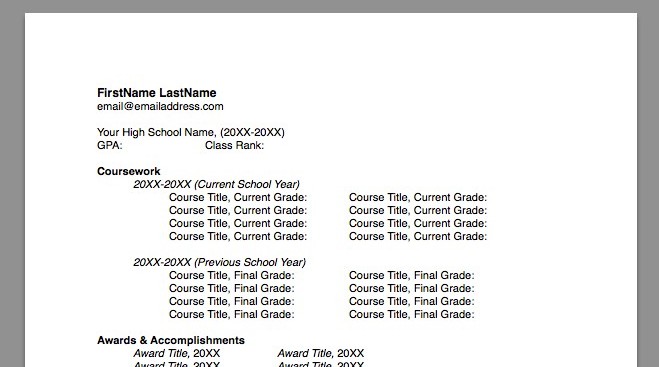High schoolers, I hate to break this to you, but you will be writing and re-writing your resume for almost the rest of your life. Sorry. It’s just a fact. The good news is that you can get ahead of the game – today – by getting started on it now and surprise your college recommenders, universities’ admissions boards, and human resource departments everywhere.
The important thing to note about resumes is that you should (almost) never submit the same resume twice. Resumes are meant to be fluid and adapt to whatever they are being used for. That said, submitting the same resume for the same type of thing does make sense – which means you might have three or four good resumes that need minimal tweaking for each application.
You should create two resumes right now. The first is for you to include with your request for college recommendations, as I describe in my article here. (Don’t worry, just follow my advice, and you’ll get great recommendations!). The second one is for to you use with your college applications. For some great inspiration for resume designs, follow my Pinterest board.
1. The “hand-this-in-with-my-request-for-a-recommendation” resume
Try make sure that all of your information fits on one page if you can. Feel free to use this template (.docx, .pdf) to get you started.
Include all of the following:
- All clubs and activities (including any leadership positions and how long you’ve participated in each one) both in school and outside of school (ie. youth group, volunteering at the local food bank, etc)
- Any awards or accomplishments
- Sports or teams you participated in and any leadership positions held
- Your hobbies
- Jobs or internships you’ve had
- Any special or extra home responsibilities you have
- A list of courses you are currently taking and your current grade in each
- A list of last year’s courses and your end of year grade in each
- Your approximate grade point average (GPA) and class rank
- What you think you want to study in college (major) and what you want to do after you finish college and why
2. The “use-on-my-college-application” resume
This resume should be more formal and more explanatory than the other. As your recommender is likely to a) know more about you in general b) know more about the awards, classes, clubs and activities at your particular high school c) will likely ask you if they need something clarified – a college application committee just won’t, so you’ll need to be more detailed. So this resume is where you need to briefly, but clearly, expand some on aspects of your resume that might be unclear to an outsider.
It’s the difference between “AP Lang Student Award” and the “Advanced Placement English Language and Composition Student of the Semester Award for all Juniors at Smith High School”.
It may feel wordy, but clarity matters. Also delete the ‘college major and why’ section and do not include special circumstances – most applications will have a separate area for you to expand on both those questions and if not, a place for you to include a separate supplement on it. Also be sure to change your resume here and there if it makes sense, too – not all university programs you are applying to are the same, so your resume shouldn’t be the same either!
Lastly – and I can’t stress this enough – proofread. Then proofread again. And then have someone else double check it for errors and typos. Even a great resume from the most brilliant student in the world will still reflect badly on the student if there are glaring typos!
3. The “scholarship-and-funding” resume
I know I said you only had to do two right now, but there is a third one you should do – the scholarship resume. Not all scholarships will ask for one, but some will. And this is where the customization of resumes comes in. Every scholarship is different and so every application you prepare (and therefore every resume) should be different. Each resume should highlight whatever it is the scholarship committee is looking for. And yes, they usually do say what it is they want in a recipient. Is it academic success? Athletic achievement? Volunteering? Whatever it is, make sure that you make that section or area the highlight of your resume. Include some of the rest, as you want to present yourself as well-rounded, but make that topic the star.
Good luck!


